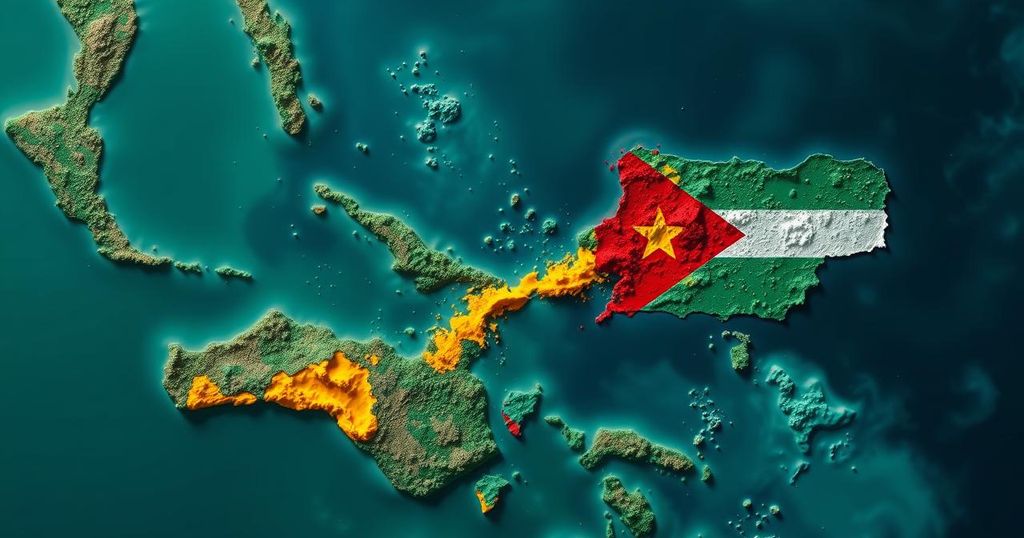Suriname and Guyana are progressing towards a cooperative approach in exploiting shared gas reserves, with key meetings held between government representatives. Actions are set to explore the Makka, Kwaskwasi, Haimara, and Pluma sites, recognizing the potential benefits of scale from collaboration. Plans are underway to establish a developmental strategy, with immediate priority given to joint technical discussions. Recent developments in the oil sector further underscore the urgency of these negotiations, aiming for substantial gas production by 2031.
Suriname and Guyana have initiated the process towards collaborative exploration of gas reserves situated in proximity to their maritime borders. Annand Jagesar, the director of Staatsolie, articulated that although immediate results will not materialize, it is vital that both nations have established mutual intent to collaborate. He elaborated on discussions regarding a developmental model aimed at rendering the extraction of gas condensates viable. Given the Makka and Kwaskwasi sites in Suriname, alongside the Haimara and Pluma findings in Guyana, this venture is poised to yield significant benefits. Jagesar emphasized the advantages of scale that arise from joint efforts, while also indicating that numerous additional elements warrant detailed consideration. Foreign Affairs, International Business, and International Cooperation Minister, Albert Ramdin, reported a constructive dialogue with Guyana’s Vice President Bharrat Jagdeo, stating that both parties acknowledged the critical need for cooperative engagement in the gas sector. Collaborative initiatives are set to be undertaken by Staatsolie, facilitated by an exchange of technical and business information with Guyanese authorities to delineate potential joint endeavors. Ramdin indicated that forthcoming strategies and scenarios will guide the cooperative efforts over the ensuing months, marking it as a priority in the strategic collaboration in oil and gas between the nations. The urgency of these discussions escalated following TotalEnergies and Apache Corporation’s announcement of a Final Investment Decision (FID) for oil extraction in Block 58. In light of this, Vice President Jagdeo convened discussions with the Surinamese government regarding the shared gas reserves. Additionally, Staatsolie is advancing towards a second FID in Block 52, where Malaysian company Petronas has identified substantial recoverable oil reserves, potentially amounting to over 400 million barrels, enabling a production capability of 100,000 barrels per day. As Staatsolie embarks on negotiations with Petronas to actualize this development, it is anticipated that production operations could commence as early as 2030. Furthermore, there is a concerted effort to explore the natural gas reserves in Block 52, with aspirations to initiate gas development by 2031, setting the stage for a robust strategic partnership in hydrocarbon exploitation for both Suriname and Guyana.
The proposal for joint gas exploration between Suriname and Guyana is part of a broader strategy to optimize the exploitation of natural resources in the region. Both countries have made significant discoveries of oil and gas within their territorial waters, which necessitates collaborative frameworks to efficiently develop these resources. The growing energy sector in this part of the Caribbean is pivotal for economic expansion, creating job opportunities, and enhancing energy security. The focus on establishing strategic cooperation in oil and gas signifies an important step in both nations’ efforts to harness their hydrocarbon potentials, contributing to long-term economic stability.
In conclusion, Suriname and Guyana’s recent discussions signify a meaningful step towards jointly managing their gas reserves. The establishment of a cooperative framework is critical for leveraging their respective discoveries of hydrocarbons, which promise substantial economic benefits. The implementation of strategies from these early discussions will be central to shaping a robust energy partnership in the Caribbean in the coming years, aiming for responsible and efficient resource exploitation.
Original Source: www.guardian.co.tt






